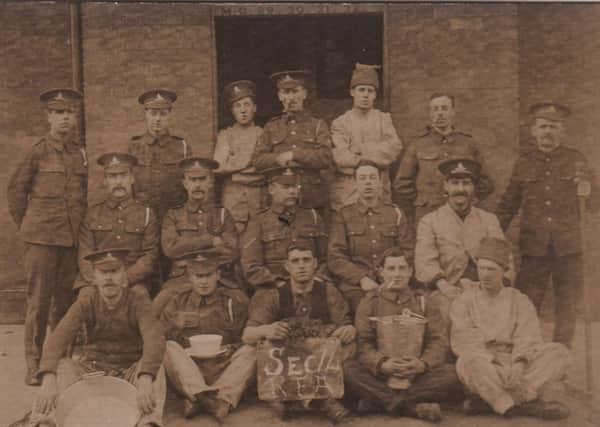'˜Exemplary' Upper Beeding veteran


Research led to Henry Scutt, born in 1875 in Shipley, the son of Charles Willard Scutt, and Sarah Ann Newman.
The 1891 census showed the couple with ten of their children at Springs Cottage, Edburton.
Henry was 16 and working as an agricultural labourer.
Advertisement
Hide AdAdvertisement
Hide AdOn January 27, 1894, Henry attempted to enlist in the Royal Artillery, giving his civilian occupation as labourer.
He said he was already serving with the Sussex Artillery, E.D.R.A. (Eastern Division, Royal Artillery, a voluntary force, possibly based at Shoreham Fort).
His medical examination noted large scars on the back of his left shoulder and said that his age physically was equivalent to 18 years (i.e. he was small for his age).
He was sent to Dover, where after five days he was discharged, giving his next of kin as his father, Charles William Scutt of Hodshrove Farm, Lewes Road, Brighton.
Advertisement
Hide AdAdvertisement
Hide AdHowever on February 12, 1895, Henry tried again and was enlisted in the Royal Artillery in Brighton.
He stated that he was still serving with the Sussex Artillery and that he had been “under standard” when he previously tried to enlist.
His medical examination the following day passed him fit for service.
Most of his service was at home except for 310 days when he took part in the Second Boer War in South Africa, from September 30, 1899, to August 6, 1900.
Advertisement
Hide AdAdvertisement
Hide AdFor this he earned the Queen’s South Africa Medal with four clasps.
These were for having taken part in the battles of Belmont on November 23, 1899; Modder River on November 28, 1899; Paardeberg from February 17 to 26, 1900; and Driefontein on March 10, 1900.
He gave his next of kin’s name as Charles M. Scutt, of Little Oram Farm, Henfield, and was discharged from service on February 11, 1907.
His character was said to be exemplary and he received a war gratuity of £5.
Advertisement
Hide AdAdvertisement
Hide AdIn 1901, Henry married Florence Gravett (née Floss) in Camberwell and their first child was born there in 1902.
Their second child was born in Upper Beeding in 1904.
The 1911 census listed him in Small Dole, aged 36, a general labourer at the Cement Works, with Florence aged 34.
By this time they had been married for nine years and had five children, four of whom were living.
Henry then served in the First World War and though his service record has not been found, his Medal Roll Index Card gave his rank in the Royal Field Artillery as Bombardier Acting Quarter Master Sergeant, reverting to Sergeant on January 21, 1916.
Advertisement
Hide AdAdvertisement
Hide AdHe had served in France from December 13, 1915, and so merited a 1914/1915 Star, British War Medal, Victory Medal and a Silver War Badge.
Later in the war Henry served in the Labour Corps in Italy when he was mentioned in despatches.
After the war Henry and Floss lived in Small Dole before moving to 3 Henfield Road, Upper Beeding, next to Castletown Stores, where they were listed on the 1952 electoral roll.
Henry died in 1957, aged 82, followed by Florence in 1962.
---
Don’t miss out on all the latest breaking news where you live.
Advertisement
Hide AdAdvertisement
Hide AdHere are four ways you can be sure you’ll be amongst the first to know what’s going on.
1) Make our website your homepage
2) Like our Facebook page
3) Follow us on Twitter
4) Register with us by clicking on ‘sign in’ (top right corner). You can then receive our daily newsletter AND add your point of view to stories that you read here.
And do share with your family and friends - so they don’t miss out!
Always the first with your local news.
Be part of it.